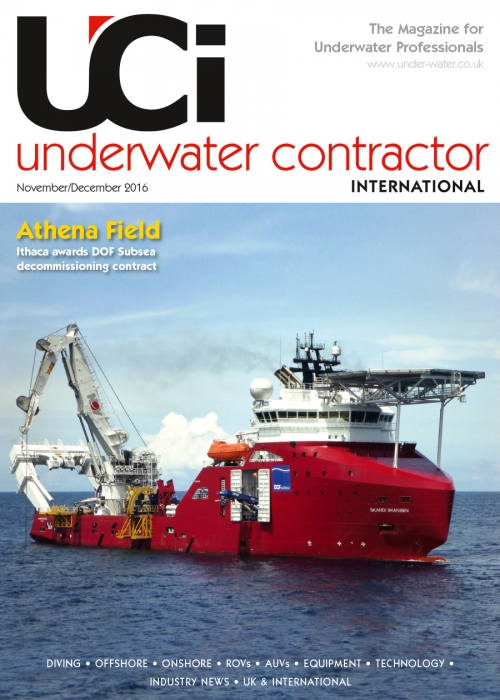
The Magazine for Underwater Professionals
![]() Jan/Feb 2015
Jan/Feb 2015
COCKS' COLUMN
A challenging year ahead for the underwater world
Although my last column spoke of a slow down in oil company spending, I had not foreseen the sharp decline in the oil price and rouble. With further uncertainty in the Middle East, financial worries at Petrobras and very mixed signals from oil service companies, with sharply contrasting forecasts from Petrofac and the ever-reliable Wood Group, it is hard to be optimistic for the underwater world in the coming year.
In the UK, a general election, only a few months away, adds to the uncertainty, with the three major parties all likely to suffer from incursions by fringe parties. At least unemployment, except perhaps for commercial divers, continues to fall and inflation, helped by the oil price decline, presents no threat. I must also refer to the misguided remarks by the UK Energy Secretary, Ed Davey, and the Green Party on the wonders of renewables, which are becoming increasingly uncompetitive with fossil fuels and nuclear power.
On a more positive note, I am delighted to see that TWI North is expanding its facilities in Middlesbrough, UK, a fitting tribute to Jim Sheppard, who died in September 2014. Jim was largely responsible for moving the inspection exams from the turbid waters of Bovisand and I was pleased to be one of the first to dive in TWI’s new tank, largely funded by EEC money.
COSTS
Although green energy in 2013 produced almost a third more energy in the UK, the costs, particularly in payments to rich landowners, are increasing at a fast rate. GB£2.5 billion was paid out in the year to March 2013. Recent information has been much less encouraging. It was reported in August 2014 that GB£3 million was incurred in turning off wind farms in a single day. After a Freedom of Information request, the Department of Energy and Climate Change was forced to admit that the cost of household electricity will be raised by as much as 40% because of the government’s Green Energy policies and this was before the dramatic fall in the price of oil. The Adam Smith Institute has said wind farms can never be relied upon to keep the lights on, because for long periods each winter they produce barely any power.
More encouragingly, the UK government is looking at the problems caused by noise from onshore wind farms. No wonder a number of new wind farms have been cancelled and it had earlier been stated in the Freedom of Information request that Ed Davey has accepted that more wind farms are planned than are needed to meet EU renewable energy targets.
Sadly, news for tidal and wave power has also been less encouraging, with the Financial Times saying private investment is ebbing for wave energy. Aquamarine Power, whose wave machine was praised by Alex Salmond, has laid off all but its “core operational and management team”; this news follows the collapse of Pelamis, Scotland’s other most high profile wave energy pioneer. Hopefully the GB£20 million expenditure by three Scottish universities will successfully develop low carbon heating techniques.
DOWN
With the oil price down almost two thirds, there is bound to be gloomy news from oil companies and those who service the industry. It is clear that Saudi Arabia, through OPEC, can no longer influence the oil price. There have been contrasting statements from Petrofac and the Wood Group and there are cut backs on future spending plans by oil companies. Saipem has been hit by the Russian cancellation of the South Stream gas pipeline under the Black Sea from Russia to Bulgaria.
As I mentioned in my last column, Petrofac issued a reassuring update; yet a month after saying that it was confident of a strong second half year, it has now said next year income will be about 20% below its target for 2015. In sharp contrast, John Wood has said its performance in 2014 will be in line with expectation; it has recently signed a US$750 million five-year contract with British Petroleum. It has subsequently said that as a precautionary measure it is cutting the wages of some self-employed contractors, although its founder, Sir John Wood, subsequently said “the price of oil should recover by early 2016 and that that the industry should be in better shape to attract even more investment then because of initiatives currently under way”.
On a more positive note, more takeovers seem likely in the oil industry, with Halliburton having agreed to merge with Baker Hughes and Repsol is to buy Canada’s Talisman Energy for US$8.3 billion. Further consolidation is likely and this should underpin share prices to some extent.
COLLAPSE
Although some further concessions were made by the UK Chancellor of the Exchequer in tax on North Sea companies, the chairman of the independent explorers’ association Brindex has described the North Sea as close to collapse with almost no new projects profitable with oil below US$60 a barrel. Alex Salmond nonetheless is still claiming how profitable North Sea oil will be for Scotland. Other uncertainties are overhanging Mexico, where the government is under considerable pressure, and in Brazil, where Petrobras is being investigated for corruption.
The future for the underwater world seems more uncertain than for a long time but, as with the banking crisis, I am certain there will eventually be a recovery. Meanwhile jellyfish are providing a growing threat to the intakes of nuclear power stations and solar panels in a trial project are being floated on a reservoir. Perhaps here there will be some work for hard-pressed commercial divers.


